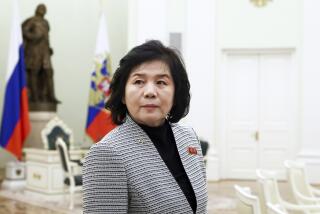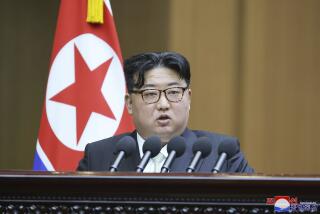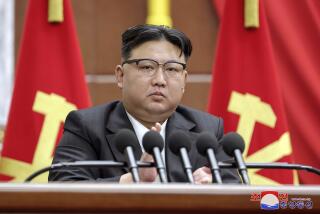Envoy vows more pressure on N. Korea
North Korea should expect more pressure over alleged crimes such as counterfeiting and money laundering as long as it continues to pursue nuclear weapons, the top U.S. negotiator with the communist state warned Thursday.
“They might have thought they were a small country that could get away with it ... but when you get involved with nuclear weapons, you get looked at,” said Assistant Secretary of State Christopher Hill, who was on his way home from an academic conference in Tokyo, where he briefly saw his North Korean counterpart. “They should not be surprised.... This is life in the fast lane.”
These were unusually threatening words from a diplomat who has generally played the role of the “good cop” in the Bush administration’s long-running effort to use carrots and sticks to get North Korea to cooperate. Hill was clearly exasperated by what he called North Korea’s “boycott” of six-nation talks that were aimed at negotiating a dismantlement of its nuclear program in exchange for energy assistance.
Lacking support from key players China and Russia for full-fledged economic sanctions, the United States -- led by its Treasury Department -- has in recent months wielded various regulatory and enforcement measures.
The perpetually cash-strapped regime in Pyongyang has been reeling from the freezing of $25 million of its funds in the Chinese territory of Macao in February after U.S. allegations of money laundering. The Treasury Department has frozen assets in the U.S. of 12 North Korean entities.
Last week, the Treasury Department said it would bar U.S. entities from any financial dealing with North Korean-flagged vessels.
At the end of the last round of talks Sept. 19, North Korea agreed in principle to dismantle its program, only to renege the following day. The talks have not reconvened, although top negotiators of all six countries involved met on the sidelines of the conference this week in Tokyo. North Korea’s top negotiator, Vice Foreign Minister Kim Kye Gwan, said Thursday that his country would only return to the talks after its funds in Macao-based Banco Delta Asia were released.
“Our demand is simple. Return the funds that were frozen. If the funds are returned, we will immediately go to the venue of the six-party talks,” said Kim in Tokyo at a rare news conference called by the North Koreans. Until the U.S. lifted what he called “financial sanctions,” Kim warned, North Korea would boost its nuclear deterrent.
U.S. officials deny that the measures against North Korea are financial sanctions, saying they are merely trying to protect the world financial system against money laundering and counterfeiting.
While repeating that denial, Hill coyly admitted that there might be a connection.
“If a country pulls out of the Nuclear Nonproliferation Treaty and begins to start reprocessing plutonium and announces it’s going to make weapons and also has a ballistic missile program going on, it’s fair to say that country, any country, is going to have its finances kind of looked at,” he said.
Hill made his remarks in a speech to the U.S. Chamber of Commerce here and later elaborated to the Los Angeles Times.
He did not say what new measures the United States might take against North Korea.
U.S. officials suspect that the Macao bank was used as a conduit for proceeds from the sale of illicit drugs, missiles and counterfeit cigarettes, and that it might have had accounts with personal funds of North Korean leader Kim Jong Il.
The investigation has involved an unusual level of cooperation between the United States and China. Sources close to the case say that investigators from the Treasury Department are in Macao, where they have been allowed by authorities there to pore over the books.
Meanwhile, in Pyongyang, a group of European businessmen this week issued a statement complaining that the U.S. measures had virtually crippled legitimate trading activity in North Korea.
“It is believed that the campaign is an attempt to dissuade foreign companies from doing business with North Korea and to drive the North Korean economy into bankruptcy,” said the European Business Assn., which represents the tiny expatriate business community in Pyongyang.
barbara.demick@latimes.com
More to Read
Start your day right
Sign up for Essential California for news, features and recommendations from the L.A. Times and beyond in your inbox six days a week.
You may occasionally receive promotional content from the Los Angeles Times.






